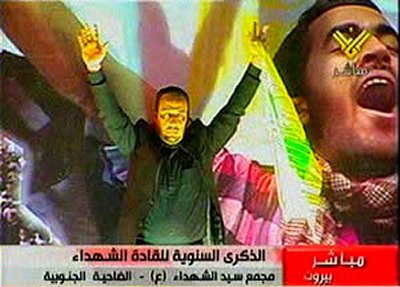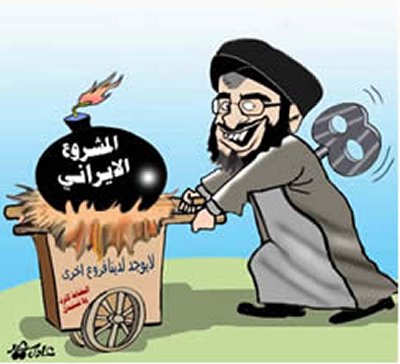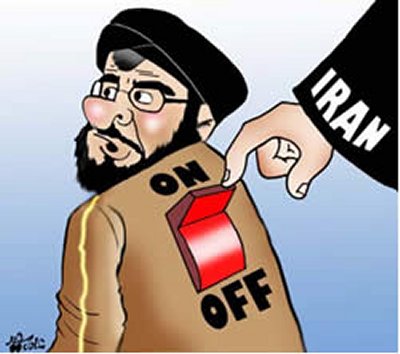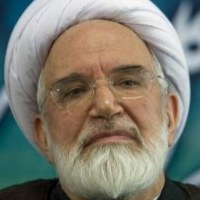![]()
Sun, Feb 20, 2011 | The Meir Amit Intelligence and Terrorism Information Center

Sami Shihab, Hezbollah operative who escaped from Egypt, waves a Hezbollah flag at the mass rally (Al-Manar TV, February 16, 2011).
Egypt: Escaped Hezbollah Terrorist Participated in Hezbollah Rally in Beirut
Sami Shihab, a Hezbollah operative who escaped from an Egyptian prison, participated in a Hezbollah rally in Beirut. His network infiltrated operatives and weapons into the Gaza Strip and planned attacks against tourist sites in Egypt. His public appearance was a Hezbollah defiance of Egypt and might indicate Hezbollah-Iran self-confidence.
Overview
On February 16 Hezbollah held its annual rally in the southern suburb of Beirut, commemorating the deaths of three of its senior operatives: Ghareb Harb, Abbas Mussawi and Imad Mughnieh. The main event of the rally was a speech (broadcast on a large screen) by Hezbollah leader Hassan Nasrallah. Sami Shihab, commander of a Hezbollah network in Egypt, who recently escaped from an Egyptian prison, mounted the stage and waved a Hezbollah flag.[1]

Sami Shihab, Hezbollah operative who escaped from Egypt, appears before the large crowd attending the rally (Al-Manar TV, February 16, 2011).
Sami Hani Shihab is the alias of Muhammad Yussuf Ahmed Mansour, an operative in Hezbollah’s Unit 1800. He headed a Hezbollah network in Egypt, which according to the Egyptians was directed by Iran. According to large amounts of detailed information in the Egyptian media, the network had 49 members. At first it smuggled weapons into the Gaza Strip by a route (whose starting point may have been Iran) through Sudan and from there to Egypt and the Gaza Strip through the tunnels in the Rafah area. According to the Egyptian media, at some point the network received instructions from Hezbollah to carry out attacks on Egyptian territory, especially targeting tourist sites along the Red Sea customarily visited by Israelis[2] [the summary of the information revealed by interrogating Sami Shihab and appeared in the Egyptian media in April 2009; see the Appendix].
The Egyptians regarded the exposure of the Hezbollah network as a sign of blatant Iranian intervention in Egypt’s internal affairs and national security. The genuine fear of the possible implications of Iranian subversion led the Egyptians to undertake a media campaign against Iran, around which Egyptian President Mubarak, the Egyptian foreign minister and the Egyptian media rallied. The Saudi Arabian media were also enlisted, which put Iran and the Lebanese government on the defensive.
Saudi Arabian cartoons about the exposure of the Hezbollah network in Egypt

Hassan Nasrallah, Iran's wind-up toy, pushes a wagon inscribed "We have no other branches" (i.e., in the Arab countries, a claim made by Nasrallah in his speech). The bomb reads "the Iranian project" (Al-Nadwah, Saudi Arabia, April 12, 2009)
Hezbollah’s defiance may indicate its growing self confidence (and also of Iran, its patron), which was also expressed in a speech made at the rally by Hassan Nasrallah (who threatened to attack senior IDF officers traveling abroad and even to “take over the Galilee” if Lebanon was “forced” to go to war). The reason for the self-confidence is the perception of the radical camp (Iran, Syria, Hezbollah and Hamas) that it will profit from the dramatic events in Egypt and Tunisia, which may spread to other pro-Western countries. That is true despite the fact that there is also internal unrest in the radical camp’s countries, especially Iran, unrest which is brutally suppressed by the regimes.
Appendix
Egyptian media reports about information revealed by the interrogation of Sami Shihab
On April 13, 2009, the Egyptian daily Al-Masri Al-Yawm printed a report of the interrogation of Muhammad Yussuf Ahmed Mansour, a Lebanese Shi’ite from the southern suburb of Beirut, who entered Egypt on a forged passport.
Mansour admitted that he was a Hezbollah operative, aka Sami Hani Shihab, which was verified by Hassan Nasrallah in his speech. The main points of his statements made during interrogation by the Egyptian security services were the following:
1) He admitted that as a Hezbollah operative he was enlisted by the organization’s general recruitment division. He underwent military training but suffered a spinal injury. After his recovery he joined Unit 1800, which deals with the “Palestinian issue” through “the ring countries” [i.e., the countries encircling Israel]. He received intensive intelligence training enabling him to carry out missions in Egypt.
2) In 2005 he was sent to Cairo to set up a Hezbollah network called “the Egyptian branch.” Its objective was defined as “supporting the Palestinian cause.” His direct commander in Lebanon was a Hezbollah operative named Muhammad Qabalan. Qabalan was chosen for the role because he had been in Egypt in 2007 and 2008, and was familiar with the southern Sinai Peninsula, which he had visited using a forged Egyptian passport in the name of Hassan al-Ghul.[3]
3) Hezbollah’s [Egyptian Branch] operatives conducted reconnaissance of tourist sites along the Red Sea coast to collect intelligence about vacationing Israeli tourists. [The Arab and Egyptian media reported that the network planned a number of showcase attacks at tourist sites using car bombs and explosive belts.] One of the network’s operatives was a resident of Port Said named Hassan al-Manakhili, who had been instructed to collect information about the Nuweiba area [on the Red Sea coast in the eastern Sinai Peninsula] and to conduct reconnaissance in the Ras al-Shaitan area [near Nuweiba] [On April 23, 2009, the Egyptian daily Al-Akhbar reported that Sami Shihab had instructed Hassan al-Manakhili and five other detained men from Port Said to purchase a boat and rent a fishing store in Port Said to collect information about the ships passing through the Suez Canal].
4) Hezbollah operative Muhammad Qabalan dealt with infiltrating operatives and weapons into the Gaza Strip for attacks on Israel. To that end the network purchased C4 [a high-quality plastic explosive produced in Iran] and stored it in the home of a network operative in El Arish. The explosives were used to prepare explosive belts and suitcases. In addition, the necessary equipment for making IEDs was purchased, such as electrical wires and ball bearings. On April 18 Egyptian sources close to the investigation told an Al-Sharq al-Awsat correspondent in Cairo that the explosives were supposed to have been smuggled into Israel by Israeli Arabs for use in carrying out terrorist attacks.
5) In preparation for smuggling the explosives into Israel Muhammad Qabalan went to Sudan “to make a number of logistic contacts.” He went to “make the acquaintance of African and Sudanese smugglers to infiltrate operatives into Gaza.” The smugglers agreed and would be paid $2,000 for each operative infiltrated into the Gaza Strip, and $16,000 for a car. The network infiltrated operatives into the Gaza Strip but according to the interrogation, only a small number.
Another operative who was detained, Muhammad Ramadan, admitted that he had infiltrated into Egypt [from the Gaza Strip] through the tunnels [in Rafah] with a friend. Their objective was to locate men who would infiltrate into Israel to carry out suicide bombing attacks.[4] Muhammad Ramadan met with Hezbollah network head Sami Shihab, who told him he could help him and provide him with the means of carrying out attacks. The Egyptian media claimed that the attacks were not carried out because the Israeli Arabs who were involved were apprehended by the Israeli intelligence service.
Notes:
[1] He appeared at the rally despite the fact that Hezbollah sources had previously leaked to the Arab newspaper Al-Sharq al-Awsat that he did not intend to appear. “Parliamentary sources” within Hezbollah claimed that “as opposed to the rumors, it is highly unlikely that Sami Shihab will attend the rally in Beirut’s southern suburb, and the Sayid [i.e., Hassan Nasrallah] also will not speak or transmit any information about the Hezbollah network [in Egypt]. That is because that is not the way Sayid Nasrallah will bless the evolving Egyptian revolution, and he does not intend to exploit other people’s victories” (Al-Sharq al-Awsat, February 12, 2011).
[2] For further information see the April 13, 2009 ITIC bulletin, “Egypt exposes a Hezbollah network on its soil, claiming it not only smuggled weapons into the Gaza Strip and but also planned to carry out terrorist attacks and subversion activities. Hassan Nasrallah admitted a detained Hezbollah operative was involved in smuggling but denied other accusations” at hezbollah_e010.pdf. Also see the April 28, 2009 ITIC bulletin “Exposure of a Hezbollah network in Egypt: state of affairs, implications, and reactions in Egypt and in the Arab and Muslim world” at hezbollah_e011.pdf.
[3] The Egyptian intelligence service interrogation revealed that Hezbollah customarily used the names of deceased Lebanese Sunnis to forge passports for its operatives (Al-Arab, April 22, 2009).
[4] The Egyptian media did not state which organization Muhammad Ramadan and his friend belonged to, part of Egypt’s tendency to focus on Iran and Hezbollah and to downplay the support Hamas gives Hezbollah networks. The Egyptian media also noted that among those detained were two Fatah operatives who admitted under interrogation that they had infiltrated into Egypt from the Gaza Strip. Both had been instructed to go to Sudan, Syria and Lebanon for training in carrying out suicide bombing attacks (Al-Masri Al-Yawm, April 16, 2009).



 RSS
RSS











#Egypt: Escaped #Hezbollah #Terrorist Participated in Hezbollah Rally in #Beirut | #Israel #Lebanon http://j.mp/hWIrTT
RT @CrethiPlethi: #Egypt: Escaped #Hezbollah #Terrorist Participated in Hezbollah Rally in #Beirut | #Israel #Lebanon http://j.mp/hWIrTT
RT @CrethiPlethi: #Egypt: Escaped #Hezbollah #Terrorist Participated in Hezbollah Rally in #Beirut | #Israel #Lebanon http://j.mp/hWIrTT